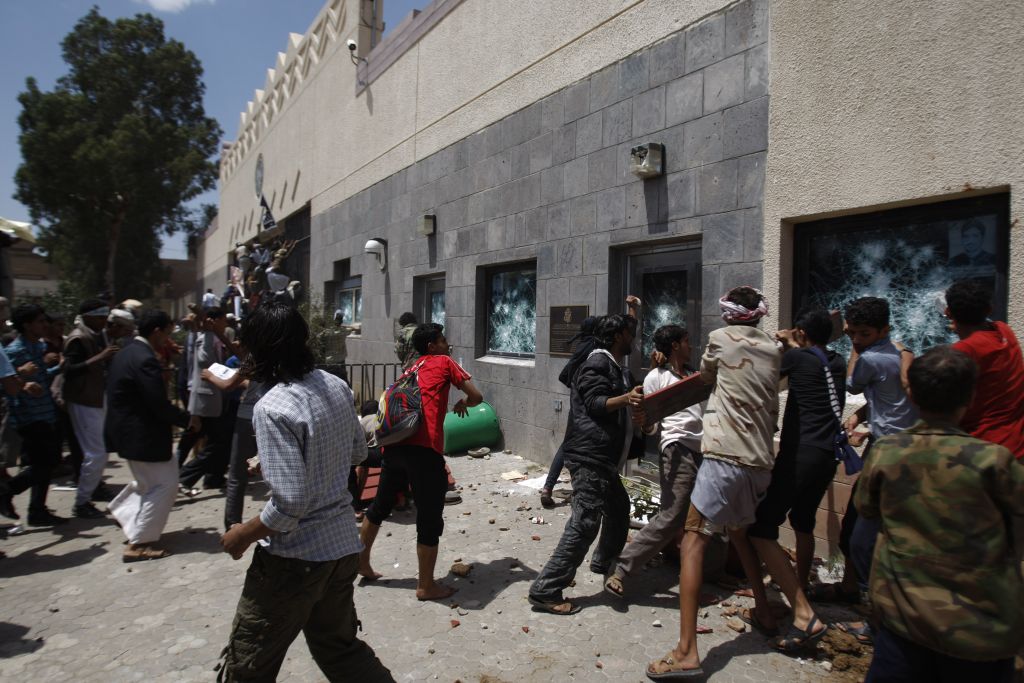September 13, 2012 – On the 11th anniversary of September 11th, violent Muslim protests swept over the US Embassy in Cairo and the US consulate in Benghazi leaving 4 dead, including the US Ambassador to Libya Christopher Stevens. Americans are outraged at these attacks on US sovereignty, attacks that could be viewed as an act of war. Indeed, two navy destroyers are currently being deployed off the coast of Libya.
The attacks were allegedly sparked by negative portrayals of the prophet Mohammed in a film by Sam Bacile. Yet, every thinking person knows that this is nothing more than an excuse for violence. There are hundreds of publications, videos, films, books and blogs in the West that could be taken as an "insult to the prophet", especially given the relatively thin-skin that evolution has apparently selected for in North Africa and the Middle East.
The “insult to the prophet” justification for Muslim violence is beginning to sound a little hollow especially when it is regularly trotted out any time a radical group decides to resort to violence. In fact, the very notion that Allah is so jealous of the prophet's reputation and so impotent at defending it Himself that he is dependent upon mob justice is hardly a flattering portrayal of the ‘Lord of the Worlds’.
It is difficult to imagine there being a strong theological foundation for such a position. Yet the Joint Chiefs Chairman has apparently made an appeal to a Florida pastor asking him to withdraw support for the film. We can, of course, be thankful that this pastor was not put in front of a firing squad or thrown into a dungeon, which is what would have certainly happened in many Muslim countries.
The fact that a senior US military official is making these overtures of appeasement is disturbing, especially when the lastest intelligence is that the attacks were coordinated and carried out by individuals with military training and hardware, hardly your garden-variety mob and more proof that the “insulting the prophet” claims are merely meant to provide cover.
Back to the attacks... These acts of violence should come as no surprise to anyone. But our capacity to be surprised by the obvious is one of the truly baffling things about human nature. So, let’s recap and see if we can make sense of the latest developments in the Muslim world.
The unrest that began in Tunisia in December 18, 2010 and spread throughout the Middle East was eventually dubbed the ‘Arab Spring’, which to the informed observer is a complete misnomer, a sign that ignorance is bliss, hope springs eternal and optimisim can be a psychological disorder indicating a serious disconnect with reality.
Spring? Who thinks up this stuff? If one means the blooming of bigoted Islamic fascism, then maybe, just maybe, ‘spring’ is a fitting description. However, those with experience in the Middle East always knew that the 'Arab Spring', this movement to plant ‘democracy’ in the poisonous soil of the Middle East, would yield a harvest of religious radicalism and further violence.
The reason is simple and can be illustrated with the open elections held in Palestine at the urging of the US in 2006. This democratic process to validate the “will of the people” brought to power the political wing of one of the world’s most radical terrorist groups – Hamas. This immediately led to armed conflict, resulting in the division of the Paletinian territory into the Gaza Strip controlled by Hamas and the West Bank controlled by Fatah.
Would it be a truism to say that a fervently religious population guided by an ideology that explicitly marries religion and politics will elect officials who have similar values? Probably so, but it clearly bears repeating. Democracy is no panacea to the ills of Muslim societies. It does, however, guarantee that the Islamic values held by the majority will play a larger role in politics.
Fast forward from 2006 to December 2010 and the start of the Arab spring that received direct and indirect support from America. First, the admittedly corrupt, but pro-Western president of Tunisia was deposed and eventually replaced with the Islamist Ennahda Party. Islamic Fundamentalists 1 – Middle East Tolerance 0.
Later, Egyptian leader Hosni Mubarek, a staunch US ally in the face of domestic opposition, a leader who honored a peace treaty with Israel, negotiated peacefires with Hamas and kept Muslim fundamentalists from gaining political power in his own country was thrown under the bus.
The result? The ‘relatively’ secular regime of the most influential Arab country in the world was replaced by the Muslim Brotherhood in ‘democratic elections,’ resulting in more fundamentalist government, more persecution of non-Muslim minorities, and the storming of the US Embassy this past Tuesday. Islamic Fundamentalists 2 – Middle East Tolerance 0.
Then, just last year, the US and NATO encouraged and assisted a popular uprising in Libya aimed at overthrowing that murderous tyrant and dictator Muammer Gaddafi. The Libyan dictator had a troubled history with the West due to issues such as the Lockerbie and Berlin bombings, his demands for greater revenues from Libyan oil, intense opposition to the state of Israel and a laundry list of other sordid and sundry crimes.
Yet, he was no friend of fundamentalist terror groups either. He is reported to have personally presided over executions of members of the Islamic extremist group Hizb-ut Tahrir. Religion was for Gaddafi a political tool not an ideology.
In 2003, however, after the downfall of Iraq, he renounced his WMD program and began full cooperation with international inspectors. Yet, his sins caught up with him, and the tryant had to go to make room for democracy. It is not yet clear, but if the murder of the US ambassador on Tuesday is any indication, the Islamic Fundamentalists are advancing on an unprotected goal and likely to score again.
If the secular “Butcher of Damascus” Hafez al-Assad is brought down in the months to come, the next Syrian government will also be a fundamentalist Sunni government as the Free Syrian Army has already proven itself to be just as violent but more “pious” than its oppponent.
If there is a common thread here, it is that the US has overtly supported the overthrow of all these admittedly corrupt but also non-fundamentalist regimes while equally corrupt but overtly religious governments like those in Bahrain and Saudi Arabia, which also faced popular dissent as a result of the Arab Spring, were spared any negative coverage and the uprising were quietly and resolutely suppressed without receiving US support.
Apparently, the US policy of supporting democracy only applies to dictators that are non-religious like Gaddafi, Saddam, Mubarek, and Assad, but not to the House of Saud and Bahrain.
On Tuesday, the US reaped the first fruits of the ‘Arab Spring’ in the form of death and mayhem. Let’s all hope that this ‘Arab Spring’ doesn't transform the Middle East into a Muslim Brotherhood fraternity house of such religious intolerance and fanaticism that we one day long for men like Saddam and Gaddafi.
The attacks were allegedly sparked by negative portrayals of the prophet Mohammed in a film by Sam Bacile. Yet, every thinking person knows that this is nothing more than an excuse for violence. There are hundreds of publications, videos, films, books and blogs in the West that could be taken as an "insult to the prophet", especially given the relatively thin-skin that evolution has apparently selected for in North Africa and the Middle East.
The “insult to the prophet” justification for Muslim violence is beginning to sound a little hollow especially when it is regularly trotted out any time a radical group decides to resort to violence. In fact, the very notion that Allah is so jealous of the prophet's reputation and so impotent at defending it Himself that he is dependent upon mob justice is hardly a flattering portrayal of the ‘Lord of the Worlds’.
It is difficult to imagine there being a strong theological foundation for such a position. Yet the Joint Chiefs Chairman has apparently made an appeal to a Florida pastor asking him to withdraw support for the film. We can, of course, be thankful that this pastor was not put in front of a firing squad or thrown into a dungeon, which is what would have certainly happened in many Muslim countries.
The fact that a senior US military official is making these overtures of appeasement is disturbing, especially when the lastest intelligence is that the attacks were coordinated and carried out by individuals with military training and hardware, hardly your garden-variety mob and more proof that the “insulting the prophet” claims are merely meant to provide cover.
Back to the attacks... These acts of violence should come as no surprise to anyone. But our capacity to be surprised by the obvious is one of the truly baffling things about human nature. So, let’s recap and see if we can make sense of the latest developments in the Muslim world.
The unrest that began in Tunisia in December 18, 2010 and spread throughout the Middle East was eventually dubbed the ‘Arab Spring’, which to the informed observer is a complete misnomer, a sign that ignorance is bliss, hope springs eternal and optimisim can be a psychological disorder indicating a serious disconnect with reality.
Spring? Who thinks up this stuff? If one means the blooming of bigoted Islamic fascism, then maybe, just maybe, ‘spring’ is a fitting description. However, those with experience in the Middle East always knew that the 'Arab Spring', this movement to plant ‘democracy’ in the poisonous soil of the Middle East, would yield a harvest of religious radicalism and further violence.
The reason is simple and can be illustrated with the open elections held in Palestine at the urging of the US in 2006. This democratic process to validate the “will of the people” brought to power the political wing of one of the world’s most radical terrorist groups – Hamas. This immediately led to armed conflict, resulting in the division of the Paletinian territory into the Gaza Strip controlled by Hamas and the West Bank controlled by Fatah.
Would it be a truism to say that a fervently religious population guided by an ideology that explicitly marries religion and politics will elect officials who have similar values? Probably so, but it clearly bears repeating. Democracy is no panacea to the ills of Muslim societies. It does, however, guarantee that the Islamic values held by the majority will play a larger role in politics.
Fast forward from 2006 to December 2010 and the start of the Arab spring that received direct and indirect support from America. First, the admittedly corrupt, but pro-Western president of Tunisia was deposed and eventually replaced with the Islamist Ennahda Party. Islamic Fundamentalists 1 – Middle East Tolerance 0.
Later, Egyptian leader Hosni Mubarek, a staunch US ally in the face of domestic opposition, a leader who honored a peace treaty with Israel, negotiated peacefires with Hamas and kept Muslim fundamentalists from gaining political power in his own country was thrown under the bus.
The result? The ‘relatively’ secular regime of the most influential Arab country in the world was replaced by the Muslim Brotherhood in ‘democratic elections,’ resulting in more fundamentalist government, more persecution of non-Muslim minorities, and the storming of the US Embassy this past Tuesday. Islamic Fundamentalists 2 – Middle East Tolerance 0.
Then, just last year, the US and NATO encouraged and assisted a popular uprising in Libya aimed at overthrowing that murderous tyrant and dictator Muammer Gaddafi. The Libyan dictator had a troubled history with the West due to issues such as the Lockerbie and Berlin bombings, his demands for greater revenues from Libyan oil, intense opposition to the state of Israel and a laundry list of other sordid and sundry crimes.
Yet, he was no friend of fundamentalist terror groups either. He is reported to have personally presided over executions of members of the Islamic extremist group Hizb-ut Tahrir. Religion was for Gaddafi a political tool not an ideology.
In 2003, however, after the downfall of Iraq, he renounced his WMD program and began full cooperation with international inspectors. Yet, his sins caught up with him, and the tryant had to go to make room for democracy. It is not yet clear, but if the murder of the US ambassador on Tuesday is any indication, the Islamic Fundamentalists are advancing on an unprotected goal and likely to score again.
If the secular “Butcher of Damascus” Hafez al-Assad is brought down in the months to come, the next Syrian government will also be a fundamentalist Sunni government as the Free Syrian Army has already proven itself to be just as violent but more “pious” than its oppponent.
If there is a common thread here, it is that the US has overtly supported the overthrow of all these admittedly corrupt but also non-fundamentalist regimes while equally corrupt but overtly religious governments like those in Bahrain and Saudi Arabia, which also faced popular dissent as a result of the Arab Spring, were spared any negative coverage and the uprising were quietly and resolutely suppressed without receiving US support.
Apparently, the US policy of supporting democracy only applies to dictators that are non-religious like Gaddafi, Saddam, Mubarek, and Assad, but not to the House of Saud and Bahrain.
On Tuesday, the US reaped the first fruits of the ‘Arab Spring’ in the form of death and mayhem. Let’s all hope that this ‘Arab Spring’ doesn't transform the Middle East into a Muslim Brotherhood fraternity house of such religious intolerance and fanaticism that we one day long for men like Saddam and Gaddafi.

 RSS Feed
RSS Feed

